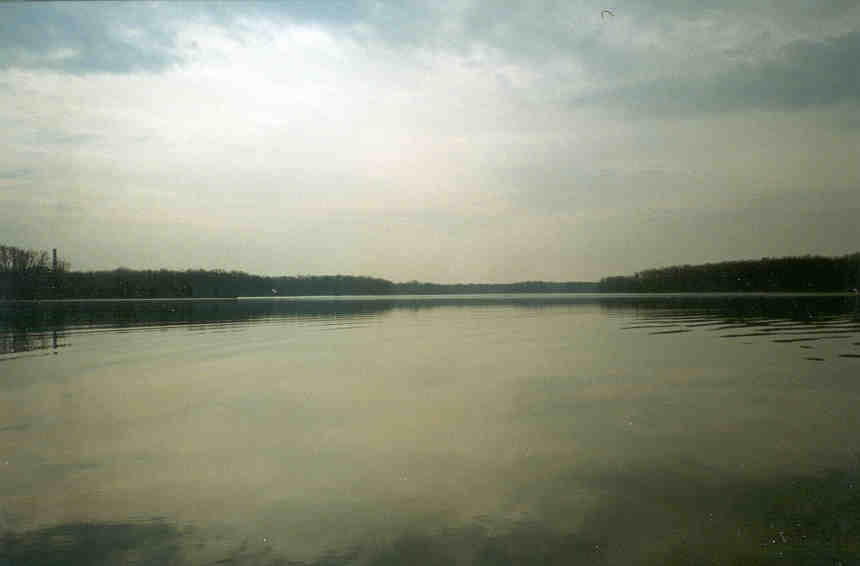
Ph.D. Thesis, 2001
Department of Civil Engineering
Northwestern University

Lake DePue, IL, November 1998
Download Chapters in PDF Format
The work described within examines metal speciation and the interactions between metals and microbiology in both laboratory settings and the natural environment. The approach is unique for its examination of metals using advanced microscopic and spectroscopic tools. The significance of this work is the novel approach that is taken in the collection, processing, and analysis of X-ray absorption data, using a continuous scanning technique (CS-XAS). This allows the acquisition of the experimental error, which can be carried through each step of the data reduction process. A computer code, SamXAS was developed to utilize the data and the errors for the spectral deconvolution of environmental samples. The deconvolution was based upon a set of geochemically relevant reference compounds that are expected in sedimentary environments. To this end, a combination of analytical electron microscopy (AEM) and CS-XAS is exceptionally helpful. In addition to providing information on particle morphology and spatial relations, data from AEM gives the elemental associations on individual particles that can be used to infer their composition. From this information, the appropriate standard compounds can be chosen for XAS to verify the observations from AEM.
These techniques were then applied to examine the metal speciation in a complex, contaminated environment. Results from a study of Lake DePue, IL show that the metal speciation changes significantly as function of the contamination gradient. From joint observations with these two methods, zinc shifts from highly labile and mobile chemical forms in the most contaminated regions, to relatively stable, buried sulfides once transported away from the site. In addition, many of the speciation changes that occur in the sediments are mediated through microorganisms. Through the inference of chemical changes and direct microscopic evidence, these microbes are intimately associated with zinc contamination in the sediment. Isolates from the lake were grown in pure culture in the laboratory to examine the chemical changes that they govern in closer detail. With the aide of microcosm experiments and pure culture experiments, the microbes from Lake DePue display a wide array of chemical interactions with zinc and cadmium in the environment. These include the production of insoluble phosphates and the incorporation of zinc into thiol bound proteins.
1.0 Introductory Remarks 1
2.0 Background 4
2.1 Biogeochemical processes in freshwater sediments
2.2 Metal cycling in lake sediments
2.3 Microbial interactions with metals
2.4 Analytical Considerations
2.5 Hypothesis
2.6 Objectives
3.0 Significance of Work 28
4.0 Material and Methods 32
4.1 Field Setting
4.2 Field sampling
4.2.1 Water column sampling
4.2.2 Sediment sampling
4.2.3 Porewater sampling
4.3 Aquatic chemical methods
4.3.1 Colorimetric methods
4.3.2 Heavy metal determination
4.3.3 Sequential Extractions
4.3.4 Capillary electrophoresis
4.3.5 Voltammetry
4.4 X-ray absorption spectroscopy
4.4.1 Theory
4.4.2 Experimental
4.4.3 Data analysis
4.4.4 Spectral deconvolution
4.5 Electron microscopy
4.5.1 SEM analysis
4.5.2
TEM analysis preparatory technique
5.0 Physicochemical properties of Lake DePue 75
5.1 Water column properties
5.2 Properties at C1
5.3 Sediment characterization
6.0 Characterization of particles by AEM 85
6.1 Characterization of zinc bearing particles
6.2 Quantitative results
7.0 Quantitative determination of zinc coordination by CS-XAS 100
7.1 Sediment EXAFS profiles
7.2 Comparison to sequential extraction results
8.0 Microcosm experiments on Lake DePue sediments 115
8.1 Microcosm setup
8.2 Microcosm chemical observations
8.3 XAS of microcosm particles
8.4 Microcosm microbial populations
8.5 Results of the microcosm experiments
9.0 Microbial response to zinc and cadmium in pure culture 135
9.1 Analysis of CS-EXAFS spectra from microbial samples
9.2 Microbe isolation and characterization
9.3 Metal coordination in whole microbial cells
9.3.1 DePue Isolate X
9.3.2 DePue Isolates D and Mt
9.3.3 DePue Isolate Z
9.3.4 Cadmium binding in DePue Isolate X
9.3.5 Coordination of zinc to bacterial cell walls
9.4 Summary
10.0 Conclusions 171
11.0 References 178
12.0 Appendix A: DND-CAT data collection manual 191
13.0 Appendix B: SamXAS manual 226
Chapter 1 Chapter 2 Chapter 3 Chapter 4 Chapter 5
Chapter 6 Chapter 7 Chapter 8 Chapter 9 Chapter 10
Chapter 11 Chapter 12 Chapter 13
Sam Webb
SSRL/SLAC Bldg. 137, MS69
2575 Sand Hill Rd.
Menlo Park, CA 94025
E-mail: samwebb@slac.stanford.edu
voice: (650) 926-3734
fax: (650) 926-4100